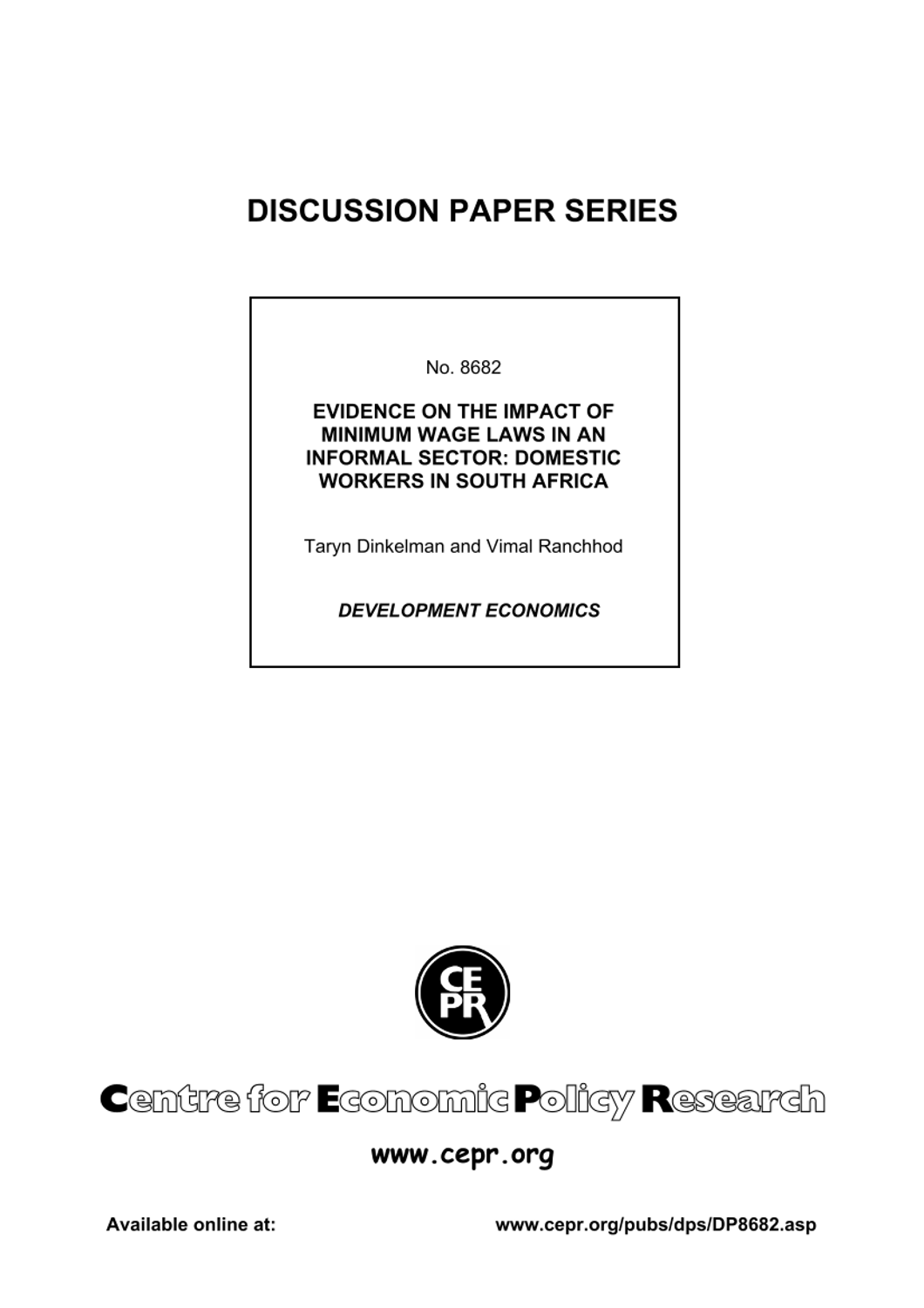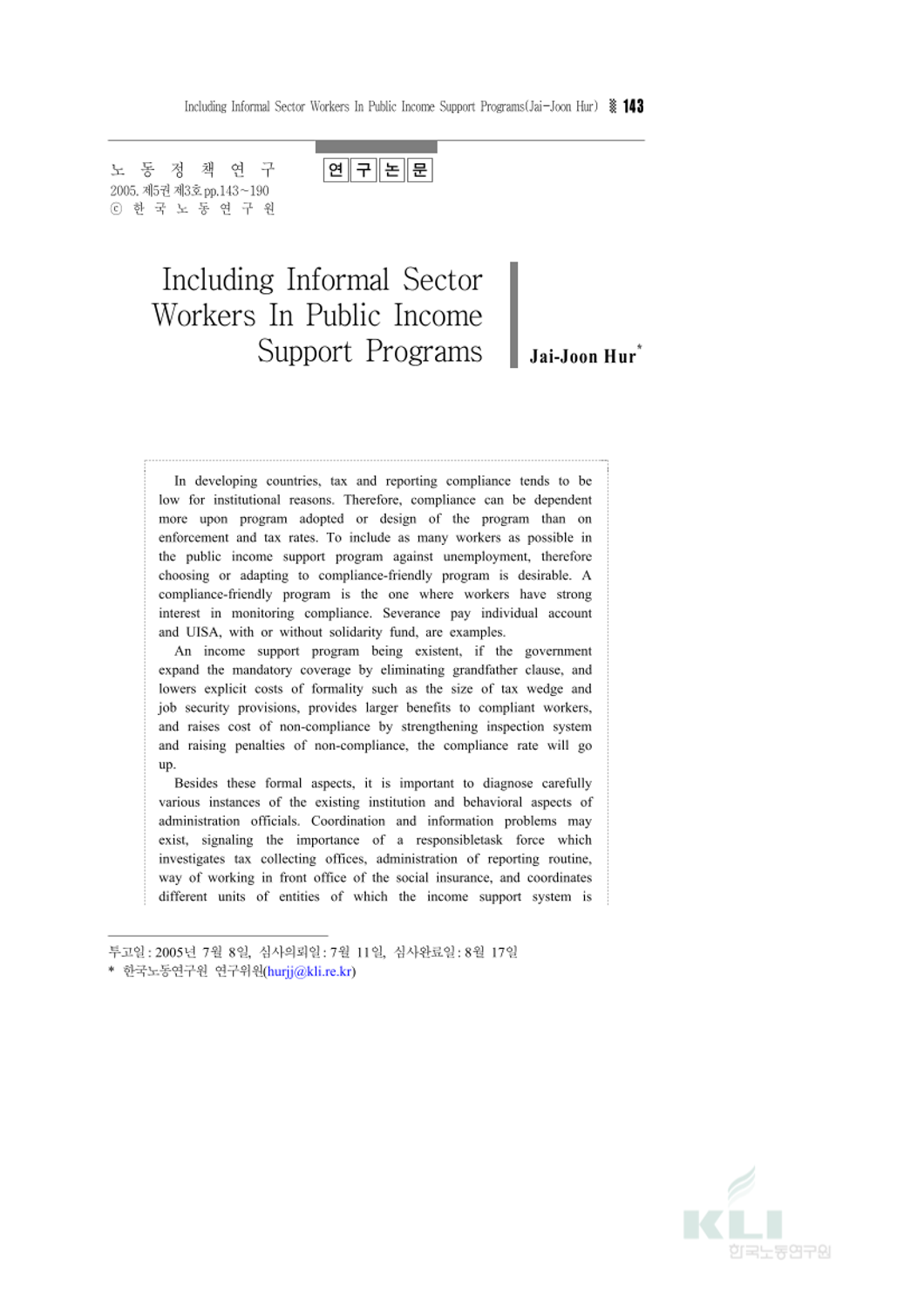
단행본
Informality: Exit and Exclusion
- 저자
- Perry, Guillermo E, Arias, Omar S., Fajnzylber, Pablo, Maloney, William F., Mason, Andrew D., Saavedra-Chanduvi, Jaime
- 청구기호
- 330 INF2007
- 발행사항
- Washington,DC: World Bank, 2007
- 형태사항
- 248 p
- 서지주기
- Includes bibliographical references
- ISBN
- 9780821370926
- 분류기호
- 듀이십진분류법->330
소장정보
| 위치 | 등록번호 | 청구기호 / 출력 | 상태 | 반납예정일 |
|---|---|---|---|---|
이용 가능 (1) | ||||
| 한국노동연구원 | 00006717 | 대출가능 | - | |
이용 가능 (1)
- 등록번호
- 00006717
- 상태/반납예정일
- 대출가능
- -
- 위치/청구기호(출력)
- 한국노동연구원
책 소개
This volume analyzes the causes for informality in Latin America--the flawed relationship between citizens and their state shown in things like unprotected workers and underpayment of taxes--as well as the implications of its growth. Specifically, Perry et al. (of the Latin American and Caribbean Region of the International Bank for Reconstruction and Development/The World Bank) consider informality in labor that is driven by exclusion from state benefits or the routes of economy, and that driven by voluntary "exit" decisions resulting from private cost-benefit calculations that lead workers to opt out of formal institutions. They discuss what informality is and how to measure it, earnings and welfare assessments and what they reveal about workers and their decision making process, what determines the size of the sector, microform dynamics, private firms, social protection and antipoverty policies, and the role of social norms. The report builds on regional studies from the past decade, and draws from regional household surveys and research in partner countries. It is aimed at professionals and academics studying labor market, social protection, tax, microenterprise development, and urban public policies, and those working in government, international organizations, research institutions, and universities. The book lacks an index. Annotation ©2007 Book News, Inc., Portland, OR (booknews.com)
목차
Foreword p. xi
Acknowledgments p. xiii
Abbreviations p. xv
Overview: Informality: Exit and Exclusion p. 1
The razon de ser of the informal sector: Adding exit to exclusion p. 1
Workers: A mix of opting out and exclusion p. 4
Firms: Little gain, high costs, or weak enforcement? p. 9
Need for more effective and legitimate institutions p. 12
Summing up: Policy implications of the report p. 13
Informality and the development agenda p. 19
Note p. 19
References p. 19
Chapter 1 The Informal Sector: What Is It, Why Do We Care, and How Do We Measure It? p. 21
Introduction: What is informality? p. 21
Informality and the relationship between the individual and the state p. 22
Three margins of informality p. 25
Measuring the informal sector p. 28
Correlations among measures and trends over time p. 35
Conclusions p. 37
Annex p. 39
Notes p. 39
References p. 40
Chapter 2 The Razon de Ser of the Informal Worker p. 43
Informal work: Adding exit to exclusion p. 43
The sectors of informal labor: Characteristics and dynamics p. 48
Motivations for participation in informal work p. 62
Conclusions p. 74
Notes p. 74
References p. 75
Chapter 3 Informality, Earnings, and Welfare p. 79
Compensating differentials, comparative advantage, and informal work p. 80
The question of equal pay for equal work in the informal and formal sectors p. 85
Informality and self-rated welfare p. 92
Conclusions and policy implications p. 98
Notes p. 99
References p. 99
Chapter 4 The Informal Labor Market in Motion: Dynamics, Cycles, and Trends p. 101
Informality through the lens of gross labor force dynamics p. 102
Drivers of the increase in informality p. 112
Conclusion p. 125
Notes p. 127
References p. 128
Chapter 5 Microfirm Dynamics and Informality p. 133
Conceptual framework: Firm dynamics and institutional development p. 134
Microfirm dynamics in Latin America p. 140
Informality among microfirms p. 148
Conclusions p. 153
Notes p. 154
References p. 154
Chapter 6 Informality, Productivity, and the Firm p. 157
Informality among registered firms p. 158
Firm-level determinants of informality p. 160
Impact of informality on firm productivity and economic growth p. 171
Conclusions p. 175
Notes p. 177
References p. 177
Chapter 7 Informality, Social Protection, and Antipoverty Policies p. 179
Informality and social protection: Why policy makers should care p. 179
The state of social protection in Latin America and the Caribbean p. 184
Private risk management and rationale for public social protection p. 190
Challenges for social protection in the face of informality p. 193
Reengineering social protection to protect all citizens p. 199
Potential costs of social protection reform: Financing essential cover p. 204
Managing the transition from here to there p. 206
Conclusion p. 208
Notes p. 210
References p. 211
Chapter 8 The Informal Sector and the State: Institutions, Inequality, and Social Norms p. 215
Social norms, the state, and informality p. 217
The tax side of the social contract in Latin America p. 223
Inequality, taxes, and transfers p. 235
Informality: A reflection of a broken social contract? p. 239
Conclusions p. 244
Notes p. 245
References




